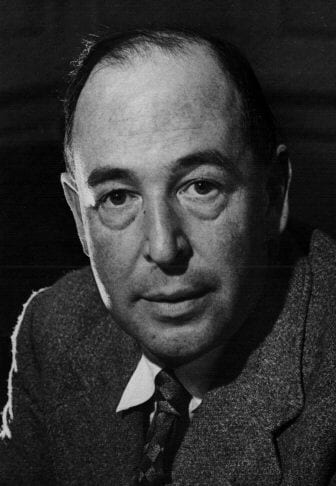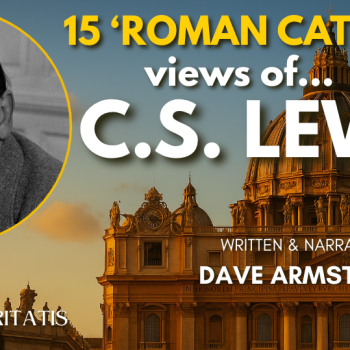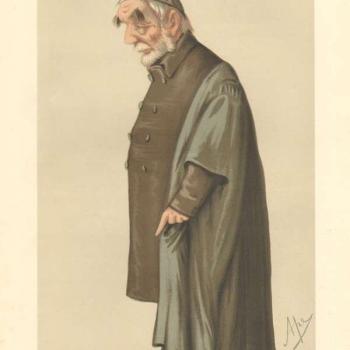
From: The Collected Letters of C. S. Lewis: Volume II: Books, Broadcasts, and the War, 1931-1949 (edited by Walter Hooper, HarperSanFrancisco, 2004)
To Dom Bede Griffiths, 4 April 1934:
I had better say once and for all that I do not intend to discuss with you in the future, if I can help it, any of the questions at issue between our respective churches. . . . I do not think there is any thing distressing for either of us in agreeing to be silent on this matter: I have had a Catholic [Tolkien] among my most intimate friends for many years and a great deal of our conversation has been religious. When all is said (and truly said) about the divisions in Christendom, there remains, by God’s mercy, an enormous common ground. It is abstaining from one tree in the whole garden.
To Arthur Greeves, 7 December 1935:
Sheed and Ward have bought the [Pilgrim’s] Regress from Dent. I didn’t much like having a book of mine, and specially a religious book, brought out by a Papist publisher . . . I have been well punished: for Sheed, without any authority from me, has put a blurb on the inside of the jacket which says ‘This story begins in Puritania (Mr Lewis was brought up in Ulster)’ — thus implying that the book is an attack on my own country and my own religion . . . the blurb is a damnable lie told to try and make Dublin riff-raff buy the book.
To Dom Bede Griffiths, 20 February 1936:
One of the most important differences between us is our estimate of the importance of the differences. You, in your charity, are anxious to convert me: but I am not in the least anxious to convert you. You think my specifically Protestant beliefs a tissue of damnable errors: I think your specifically Catholic beliefs a mass of comparatively harmless human tradition which may be fatal to certain souls under special conditions, but which I think suitable for you. I therefore feel no duty to attack you . . . With other Catholics I find no difficulty in deriving much edification from religious talk on the common ground: but you refuse to show any interest except in differences.
To Dom Bede Griffiths, 29 April 1938:
About our differences: I feel that whenever two members of different communions succeed in sharing the spiritual life so far as they can now share it, and are thus forced to regard each other as Christians, they are really helping on re-union by producing the conditions without which official reunion would be quite barren. I feel sure that this is the layman’s chief contribution to the task, and some of us here are being enabled to perform it.
To Dom Bede Griffiths, 8 May 1939:
A united Christendom should be the answer to the new Paganism. But how reconciliation of the Churches, as opposed to conversions of individuals from a church to another, is to come about, I confess I cannot see. I am inclined to think that the immediate task is vigorous cooperation on the basis of what even now is common — combined, of course, with full admission of the differences. An experienced unity on some things might then prove the prelude to a confessional unity on all things. Nothing would give such strong support to the Papal claims as the spectacle of a Pope actually functioning as head of Christendom.
To Warnie Lewis, 29 March 1940:
This week I received a letter from my former pupil Mrs Neylan . . . who is trembling on the verge of Christianity . . . and asks what to read and (more difficult still) who to see. I felt almost overwhelmed by the responsibility of my reply, and naturally the more because the two other people whose conversion had something to do with me [Dom Bede Griffiths and George Sayer] became Papists!
To H. Lyman Stebbins, 8 May 1945:
My position about the Churches can best be made plain by an imaginary example. Suppose I want to find out the correct interpretation of Plato’s teaching. What I am most confident in accepting is that interpretation which is common to all Platonists down all the centuries . . . Any purely modern views which claim to have discovered for the first time what Plato meant, and say that everyone from Aristotle down has misunderstood him, I reject out of hand.
But there is something else I would also reject. If there were an ancient Platonic Society still existing at Athens and claiming to be the exclusive trustees of Plato’s meaning, I should approach them with great respect. But if I found that their teaching in many ways was curiously unlike his actual text and unlike what ancient interpreters said, and in some cases could not be traced back to within 1000 years of his time, I should reject these exclusive claims: while still ready, of course, to take any particular thing they taught on its merits.
I do the same with Christianity. What is most certain is the vast mass of doctrine which I find agreed on by Scripture, the fathers, the Middle Ages, modern R.C.’s, modern Protestants. That is true ‘catholic’ doctrine. Mere ‘modernism’ I reject at once.
The Roman Church where it differs from this universal tradition and specially from apostolic Christianity I reject. Thus their theology about the Blessed virgin Mary I reject because it seems utterly foreign to the New testament where indeed the words ‘Blessed is the womb that bore thee’ receive a rejoinder pointing in exactly the opposite direction. Their papalism seems equally foreign to the attitude of St Paul towards St Peter in the epistles. The doctrine of transubstantiation insists in defining in a way which the N.T. seems to me not to countenance. In a word, the whole set-up of modern Romanism seems to me to be as much a provincial or local variation from the central, ancient tradition as any particular Protestant sect is. I must therefore reject their claim: tho’ this does not mean rejecting particular things they say.
[Stebbins became a Catholic a year later and in 1968 founded Catholics United for the Faith]
To Daphne Harwood, 11 September 1945:
R.C.’s keep on writing to tell me (like you) that it is a pity that ‘knowing so much I should be held back from knowing so much more’!
To Don Giovanni Calabria, 6 September 1947:
Be assured that for me too the schism in the body of Christ is both a source of grief and a matter of prayers, being a most serious stumbling block to those coming in and one which makes even the faithful weaker in repelling the common foe. However, I am a layman, indeed the most lay of laymen, and least skilled in the deeper questions of sacred theology. I have tried to do the only thing that I think myself able to do: that is, to leave completely aside the subtler questions about which the Roman Church and Protestants disagree among themselves — things which are to be treated by bishops and learned men — and in my own books to expound, rather, those things which still, by God’s grace, after so many sins and errors, are shared by us. Nor is this a pointless task; for I find that people are unaware how many matters we even now agree on . . . Over and above that work, it has always seemed to me that I should maintain as much fraternal intercourse as possible with all those who call themselves Christians. If all were actively to do this, might we not hope that this unity of love and action over many years would precede — not to say foster — an eventual reunification of doctrines. Thirdly, there remain — what is most efficacious — prayers.
Related Reading:
C. S. Lewis’ Views on Christian Unity & Ecumenism [6-16-03]
C. S. Lewis’ Childhood in Belfast & Contra-Catholicism (Biographers and/or Friends Kreeft, Pearce, Derrick, and Possibly Tolkien Think This is Why Lewis Never Became a Catholic) [6-26-12]
Why Didn’t C. S. Lewis Become a Catholic? [8-29-14]
Dialogue on Why C. S. Lewis Didn’t “Pope” [9-1-15]
C. S. Lewis vs. St. Paul on Future Binding Church Authority [National Catholic Register, 1-22-17]
Why C. S. Lewis Never Became a Catholic [National Catholic Register, 3-5-17]
***
Photo credit: C. S. Lewis (by Arthur Strong, 1947) [Wikimedia Commons / Fair Use image used for the Wikipedia article on Lewis]
***













